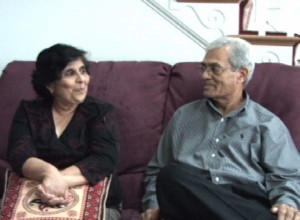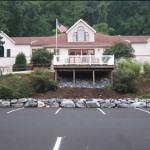Ashok and Maya Shukla
Ashok and Maya Shukla
Interview and Profile by Ashley K. Peel
Video Recording by Tara Bhattacharyya
Interview conducted on 3/25/09 in Camp Hill, PA
Ashok and Maya Shukla immigrated to the U.S. from Ahmedabad, in the state of Gujarat, India. Ashok came to the United States around 1966, and Maya came in 1969. They both came to explore new life and the educational opportunities present in America. They currently reside in Camp Hill, Pennsylvania. They have created a life in America together with their community and family, and America is now their home.
Ashok came as a student to continue his study after receiving a Master’s in economics in India. He expresses that educational achievement is a major value in his family.
[flv]http://mosaics.dickinson.edu/southasian2009/wp-content/uploads/sites/13/2009/04/my-great-movie3.flv[/flv]
“He (referring to his father) put faith in our education a lot more and he was very strong on education, you had to be educated to go ahead in life…that’s how I came to this country…”
Ashok was sponsored by his brother who came first to the U.S. for his education. Ashok explains that once his brother settled in the U.S., “He then invited me, or sponsored me to come to the United States and I followed him, and then the whole chain started.” Ashok began his Master’s at Temple University in Philadelphia, PA. He wanted to continue his education in order to receive a Ph.D. in Economics, however, he didn’t finish it because he was supporting his family. After graduation he became a professor of economics and business statistics at Northampton Community College in Bethlehem, PA for three years. Later, in 1972 Ashok came to Harrisburg and has lived there ever since. Initially he began working for Commonwealth of Pennsylvania and eventually began teaching at Penn State, Harrisburg.
“My decision was to come to study here. I intended to go back, actually right after my study, I intended to go back, but then Maya came here and we got married. We both decided to stay a little longer, then a little longer became so long that we are still here.”
Maya grew up in Porbander, a small town in India, recognized as “the birth place of Mahatma Ghandi.” Maya went to high school in Porbandar and Ahmedabad for college, “which is a big city like Philadelphia.” Ahmedabad is also where she met her future husband. Maya came to the United States at the age of twenty-four in 1969. Maya has her Master’s in accounting and auditing and Bachelor’s in law from India. Maya explains that part of the reason she stayed was because Ashok was here, “We got [married], and then there was less desire to stay apart…” Upon arrival, Maya began working in a bank, in order to help financially support her family. Ashok and Maya have two sons who were born and raised in the U.S. Learning new things was a large aspect of her immigrant experience:
[flv]http://mosaics.dickinson.edu/southasian2009/wp-content/uploads/sites/13/2009/04/maya-shukla1.flv[/flv]
Maya highlights that America’s diversity has been a major aspect of her experience. Maya has interacted with people from all parts of the world, and she enjoys that. “For me [what is] important is good people, and good people can be in any race.”
The Hindu American Religious Institute, otherwise known as the H.A.R.I. Temple, located in New Cumberland, PA, was created for their community as a religious space for worship in 1975. Ashok explains that many Indians within the community contributed to the establishment; “everybody pitched in within our community.” Ashok explains that within the community they have people of Jain faith, followers of Krishna, followers of Shiva, and followers of goddess Durga. The number of deities at the H.A.R.I. Temple illustrates the religious diversity of the Indian Hindu community: “We establish the different deities, so that we all can go at one place and worship…whatever deity you feel…this is a universal temple, in a sense that you go there, close your eyes and whatever deity you want to bring in your mind, you can go and worship. It’s that open.” Ashok and Maya both uphold their Hindu values, which are a part of their individual identities. Ashok and Maya identify as Saivites, which is one of the four major sects of Hinduism. They reveal that Hinduism is a major part of their immigrant experience. “Hindu religion is basically a way of life…”
They have passed on their religious values to their children. Ashok expresses that teaching his children the values of Hinduism was very important.”We have [taught] them faith in humanity, faith in culture, [and] faith in values.” Passing on values to children is important to the community because in order for a religion to exist, “you need faith, you need the people who follow that faith, and you need the establishment that will cater to that faith.” Therefore, in order to sustain their faith, the members of the HARI Temple hold Sunday school for the children in the community. Ashok states that most children that attend are American born. The school teaches “Hinduism as the traditional Hinduism…[the] culture…[and] we teach them values.” Ashok also notes that his boys learned the rituals from going to Temple and watching him.
In connection to their immigrant experience both Maya and Ashok agree that in America they have experienced religious diversity. Maya states, “I think America is the only country which has tolerance for all religions.” Ashok agrees, “…We have never faced any situation where we would be discriminated because we are Hindus. I have visited and she also has visited…Islamic communities and Jewish communities, Christian communities, even Atheist communities.” Both Maya and Ashok Shukla appreciate the religious diversity in America, and believe in the respect of all religions.
Ashok and Maya identify as Indian, but their home is where their family is, in America. They explain how their experience has influenced their identity: “We are Indian[s] [who] became Americans because we accepted this country as our home country now.” Both Maya and Ashok consider home to be where their community, friends and family are located. They have family dinners at least 3 times a week. Moreover, Maya emphasizes why America is their home, “Our parents, all his brothers and sisters and my family they are in America…so our home is here.” In relation to their community Ashok reveals how it adds to their concept of home, “we do want to live here within the community that we have created ourselves, which may be Indian or non-Indian,” and we feel blessed.
[flv]http://mosaics.dickinson.edu/southasian2009/wp-content/uploads/sites/13/2009/04/mr-mrs-shukla1.flv[/flv]
While Ashok originally planned to return to India after his studies, the future plans for the Shukla family are to stay in America. “I don’t plan to change my living from here to India…the reason I don’t intend to is because my entire family is here.” Although, India is still a large aspect of their life and they go to visit almost every year, America is their home. As Ashok states, “My life began here, I started my life here.”


